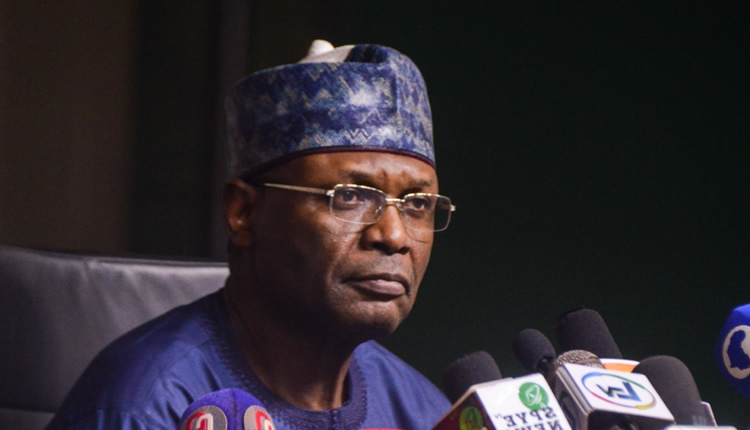
The leader of the Independent National Electoral Commission (INEC), Prof. Mahmood Yakubu, has indicated about current investigations into electoral wrongdoings and the legal action against the culprits.
He stated the commission had received case files from the Nigeria Police and is collaborating with the Nigerian Bar Association (NBA) to bring the alleged wrongdoers to justice.
Yakubu said the Economic and Financial Crimes Commission (EFCC) and the Independent Corrupt Practices Commission (ICPC) are also involved in prosecuting cases related to vote buying and associated violations.
He acknowledged that during the 2023 general election, there were certain obstacles that were structural, infrastructural and human in nature.
In his address yesterday in Abuja at a meeting with Resident Electoral Commissioners (RECs) to reflect on the recently concluded 2023 general election, Yakubu stated that compared to some earlier elections, the Commission believed that the polls were one of the most meticulously prepared in recent times.
“Drawing from previous experiences, we initiated preparations promptly after the 2019 General Election, carefully ticking the necessary boxes over a four-year period. It is the necessity to learn from both the positives and the shortcomings that makes the stocktaking that we are embarking on today essential,” he said.
He said since the conclusion of the election, various opinions have been expressed by political parties, candidates, observers, analysts, and the general public on aspects of the elections that occurred in February and March.
He said such diverse opinions should normally be expected, and the Commission welcomes all of them as long as their purpose is to improve the future conduct of elections and to strengthen our democracy.
He acknowledged the diverse opinions expressed by political parties, candidates, observers, analysts, and the general public about different aspects of the election.
However, he said the commission chose not to participate in immediate commentaries, preferring to listen, learn, and conduct its own review of the election process.
He said the commission has purposely refrained from joining these commentaries immediately after the election for several reasons.
“First, our preference is to listen more and draw lessons rather than join in the heated and often emotional public discussion on the election.
“Second, since we plan to conduct our own review of the election, we see no need to anticipate the process. Third, the commission would not want to be perceived as defensive or justificatory in joining the ongoing discussions.
“Finally, and perhaps most importantly, several issues around the election are sub-judice and it is not the intention of the Commission to either undermine or promote the chances of litigants in the various election petition courts beyond what is required of us by the legal process. Indeed, practically anything coming from the Commission could be cited by litigants as either justifying their claims or an indication of bias against them,” he said.
He mentioned that despite security challenges, currency and fuel challenges, and attacks on personnel and facilities, the elections were mostly peaceful. The use of the Bimodal Voter Accreditation System (BVAS) for voter accreditation was highly successful, with a 98 per cent success rate compared to the Smart Card Reader’s 29.2 per cent in the 2019 General Election.
The chairman emphasized that the election, despite diverse opinions on its outcome, reflected the complexity of a multi-party democracy.
He said the election produced diverse outcomes, with multiple political parties winning seats at various levels of government, indicating a shift from single-party dominance.
“Above all, despite the divergent opinions about the outcome of the election, the overall outlook suggests that it is a fair reflection of a complex multi-party democracy. We wish to remind Nigerians that elections were held for a total of 1,491 constituencies made up of one Presidential, 28 Governorship, 109 Senatorial, 360 Federal Constituencies and 993 State Assembly seats. Our record shows that these elections have produced the most diverse outcomes ever recorded since 1999.
“Today, five political parties produced State Governors, seven parties won Senatorial seats, eight are represented in the House of Representatives and nine in State Houses of Assembly. Clearly, the 10th National Assembly is certainly the most diverse in party representation since 1999. In some States around the country, different political parties controlled the legislative and executive arms of Government.
“What is clear from these records also is that the days of single party dominance of our national politics are probably gone. Furthermore, many prominent candidates lost in the constituencies they contested, and political parties lost in some of their presumed strongholds,” he said.
He acknowledged that there were challenges in the election process, including structural, infrastructural, and human factors, and the Commission is committed to addressing these challenges as part of its post-election review engagements.
In the upcoming weeks, he said internal debriefing meetings will be held, followed by engagements with stakeholders to gather feedback and insights.
The chairman urged the Resident Electoral Commissioners to lead discussions on various aspects of the election openly and constructively.
He said these discussions will cover operational processes, the legal framework, deployed technologies, administrative procedures, political party registration and primaries, ad-hoc staff recruitment and training, and strengthening the Commission’s cooperation with other bodies.
At the end of the review and stakeholder engagements, he said the Commission plans to publish an extensive report.
He said reports from accredited national and international observers will also be reviewed.
The chairman expressed the Commission’s hope for continued support from stakeholders to improve the electoral process in Nigeria.
Despite the ongoing review, he said the Commission faces additional challenges with upcoming bye-elections and off-cycle Governorship elections in several states.
The chairman commended the Resident Electoral Commissioners for their performance during the general election but urged them to remain loyal to their oath of office.
